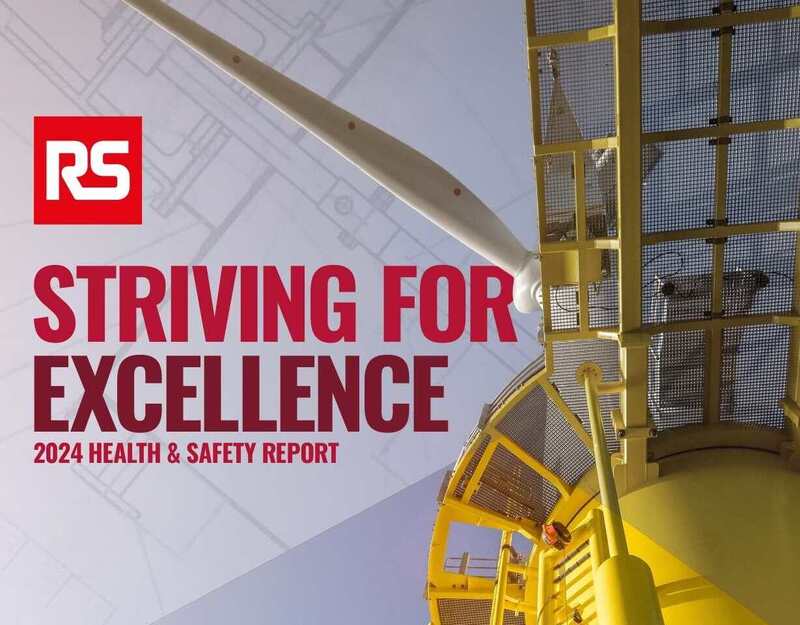Skills shortages, sustainability and women’s PPE cited as key areas of focus

Skills shortages, sustainability and women’s PPE cited by health and safety professionals as key areas of focus by a number of industries in manufacturing including food and beverage in RS’ 2024 Health & Safety report Striving for Excellence.
The report is based on findings from a survey that aimed to gain a snapshot of the environment, health and safety (EHS) profession, and explore its challenges and priorities.
The survey was completed by 891 respondents working in health and safety (H&S) roles in the UK and Ireland. They came from a variety of sectors including manufacturing – covering markets from food and beverage, automotive and pharmaceuticals through to industrial machinery, plastics and chemicals – energy and utilities, public services, logistics and retail, among others. It is the second annual survey conducted by RS, following its 2023 Under the Surface of Health & Safety report.
2024’s survey findings cover key areas for H&S professionals, including the management of EHS, compliance, women’s PPE, sustainability, and factors affecting the future of health and safety.
- Participants ranked EHS high, or extremely high, with regard to attitudes towards management of it (89%), safety culture (76%), systems, reporting and leadership (80%). Organisations’ confidence in their ability to protect both employees and end users is also high, with 88 and 89 per cent respectively ranking their abilities high or extremely high
- Mental health continues to be an area of concern, with three-quarters of respondents saying their company has a focus on this. 55 per cent are confident in their capabilities in this area
- Accident prevention was rated the highest in terms of having a business strategy around it – cited by 86 per cent of respondents – and the highest priority area of compliance
- Training and development were cited as having the biggest impact on compliance, by 68 per cent of those surveyed, followed by workplace culture at 65 per cent
- Some H&S professionals were facing challenges in their organisation when it comes to the provision of new talent. Issues mentioned included team erosion due to budget constraints and being a ‘one man band’ department
- Skills shortages in H&S are seen as the biggest risk to an organisation, cited by 47 per cent of respondents versus 41 per cent for budget cuts as a risk factor
- Sustainability is becoming a high priority area, with 78 per cent of survey respondents saying they would pay a premium for sustainable products
- While two thirds of respondents stated up to 40 per cent of people in their organisation who require PPE are women, only one per cent cited women’s PPE as an important factor when sourcing. Conversely, 82 per cent agreed, or strongly agreed, with the statement that more needs to be done to ensure PPE is suitable for women in terms of better fit, sizes and suitability
- The top three challenges for buyers of PPE, according to survey respondents, were finding suppliers who have the right stock, services or solutions (31%), sourcing quality and trustworthy parts, services or solutions (28%) and keeping up to date with new products and technology (23%). These figures mirror those from the 2023 survey
- With only 41 per cent of businesses managing PPE recycling in-house, it seems firms would welcome this service from suppliers, as 30 per cent said this would support their organisation’s business.
Ryan Plummer, director of RS Safety Solutions, noted that after the success of last year’s survey and resulting report, it wanted to follow up to see how things may have changed and also provide a focus on key areas like sustainability and fit-for-purpose PPE.
“It was interesting to see that sustainability is growing in importance, with more buyers prepared to pay a premium for sustainable products, even in the face of challenging times,” Plummer said. “The biggest PPE procurement challenge this year emerged as finding suppliers who have the right stock, services or solutions, which was chosen by more respondents, at 31 per cent versus 23 per cent last year. This highlights more than ever the need for suppliers and solutions providers to really step up collaborative working with customers, to support them in making the right product choices in accordance with their business objectives, whether they be budget, environmental or staff-centred requirements.”
RS Safety Solutions is helping to tackle this by holding regular events for customers and suppliers to share challenges, knowledge and insights. In recent months RS’ events have focused on specific topics like sustainability and women’s PPE, and have been very well-received.
The report also highlighted that more than a third (37 per cent) of respondents cite counterfeit or substandard PPE as a real issue in the industry.
Women’s PPE also seems to be an area of growing recognition, with many survey participants agreeing more needs to be done in regards to better fitting items for women. But only one per cent cited it as an important buying factor.
The survey respondents were predominantly men, at 71 per cent, and included those in job roles like H&S manager, EHS manager, and H&S adviser. More than half (53%) of participants were from large businesses with between 250 and 10,000 employees, with 29 per cent working within medium-sized organisations (50-249 head count) and 18 per cent from small businesses with 49 or fewer staff.
The RS ‘Striving for Excellence’ report can be downloaded in full by visiting https://uk.rs-online.com/web/content/m/hs-industry-report.
The report also highlighted that more than a third (37 per cent) of respondents cite counterfeit or substandard PPE as a real issue in the industry.
Related content
Source: foodanddrinktechnology.com

